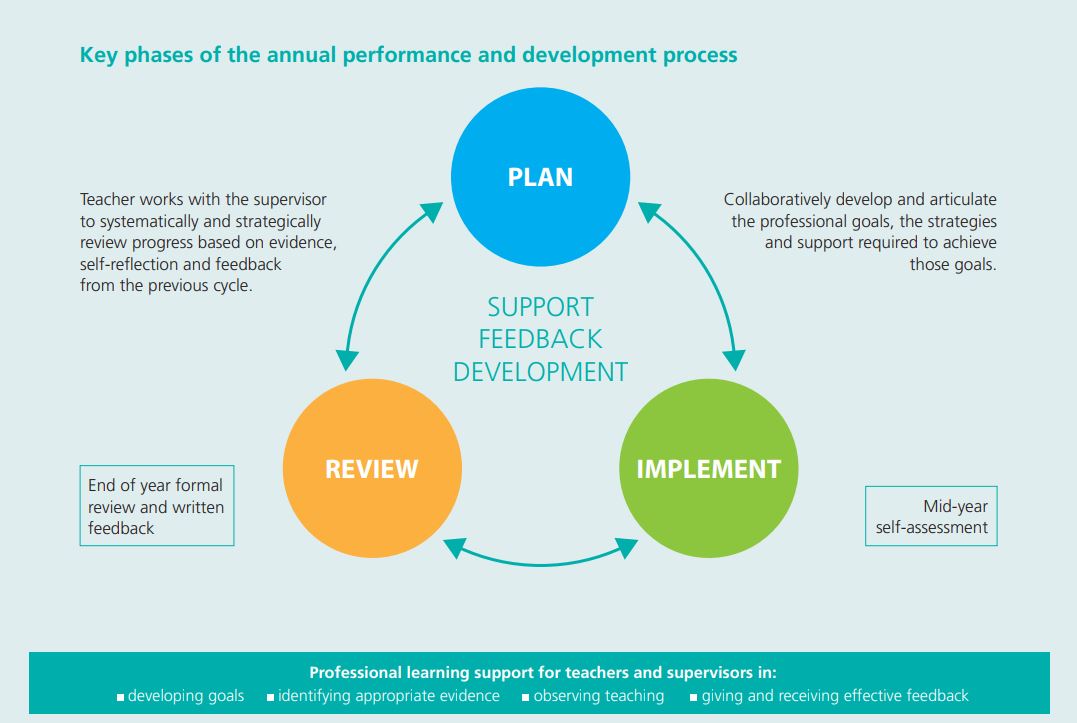Developing your Professional Development Plan
Focus Area 6.1 Use the Australian Professional Standards for Teachers and advice from colleagues to identify and plan professional learning needs.
The NSW Department of Education and Communities is committed to attracting, inducting, developing and recognising a high performing workforce. Effective performance and development requires a collaborative and supportive workplace committed to a positive culture of ongoing learning by individuals and teams. All teachers have a right to be supported in their professional learning, as well as a responsibility to be involved in performance and development processes that facilitate their professional growth and the provision of quality teaching and learning, consistent with the NSW Department of Education and Communities’ policies, aims and strategic directions and school plan. The overarching purpose of the performance and development process is to support the ongoing improvement of student outcomes through continuous development of a skilled, effective and professional teaching workforce.
Key steps in developing an effective PDP
1.Please take the time to reflect on your practice by using the AITSL Teacher Self-Assessment Tool and reviewing your previous PDP.
2.Following your self-assessment, use the SMART goal template to draft possible areas of development. Aim for 2-3 ideas. Consider:
■ system priorities
■ school priorities
■ personal teaching and career aspirations
■ accreditation requirements, where applicable.
3.Book in a time to meet with your supervisor in Week 7 or 8 to develop your PDP. Bring along your AITSL self-assessment results, previous PDP and your SMART goals. You will then work together to complete sections A, B, C & D of the PDP template.
What happens after developing your Professional Development Plan?
As part of the Performance Development Framework (Professional Development Plan), a minimum of two (2) scheduled observations will be completed by an Executive. If you leave, transfer or seek employment in another Department of Education setting, your plan will continue.
Your goals are used to inform your ongoing coaching sessions with your supervisor throughout the year and should be adjusted as your practice or needs change. Goals will be formally reviewed and adjusted in Term 3 and then again at the end of Term 4.
1.Please take the time to reflect on your practice by using the AITSL Teacher Self-Assessment Tool and reviewing your previous PDP.
2.Following your self-assessment, use the SMART goal template to draft possible areas of development. Aim for 2-3 ideas. Consider:
■ system priorities
■ school priorities
■ personal teaching and career aspirations
■ accreditation requirements, where applicable.
3.Book in a time to meet with your supervisor in Week 7 or 8 to develop your PDP. Bring along your AITSL self-assessment results, previous PDP and your SMART goals. You will then work together to complete sections A, B, C & D of the PDP template.
What happens after developing your Professional Development Plan?
As part of the Performance Development Framework (Professional Development Plan), a minimum of two (2) scheduled observations will be completed by an Executive. If you leave, transfer or seek employment in another Department of Education setting, your plan will continue.
Your goals are used to inform your ongoing coaching sessions with your supervisor throughout the year and should be adjusted as your practice or needs change. Goals will be formally reviewed and adjusted in Term 3 and then again at the end of Term 4.

